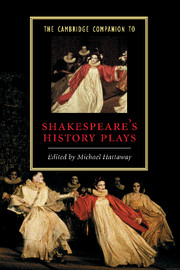Book contents
- Frontmatter
- PART 1 CONTEXTS
- PART 2 THE PLAYS
- 6 Plantagenets, Lancastrians, Yorkists, and Tudors: 1–3 Henry VI, Richard III, Edward III
- 7 Historical legacy and fiction: The poetical reinvention of King Richard III
- 8 King John: changing perspectives
- 9 Richard II: Shakespeare and the languages of the stage
- 10 Henry IV, Parts 1 and 2
- 11 Henry V: ‘the quick forge and working house of thought’
- 12 Shakespeare's ancient Rome: difference and identity
- 13 Shakespeare's other historical plays
- 14 Theatrical afterlives
- PART 3 REFERENCE MATERIAL
13 - Shakespeare's other historical plays
from PART 2 - THE PLAYS
Published online by Cambridge University Press: 28 May 2006
- Frontmatter
- PART 1 CONTEXTS
- PART 2 THE PLAYS
- 6 Plantagenets, Lancastrians, Yorkists, and Tudors: 1–3 Henry VI, Richard III, Edward III
- 7 Historical legacy and fiction: The poetical reinvention of King Richard III
- 8 King John: changing perspectives
- 9 Richard II: Shakespeare and the languages of the stage
- 10 Henry IV, Parts 1 and 2
- 11 Henry V: ‘the quick forge and working house of thought’
- 12 Shakespeare's ancient Rome: difference and identity
- 13 Shakespeare's other historical plays
- 14 Theatrical afterlives
- PART 3 REFERENCE MATERIAL
Summary
Shakespeare’s plays on the reigns of English monarchs from King John to Henry V, together with his later groups of plays on ancient Rome, constitute what most of us think of as his history plays. A number of his other mature works have some connection with history and, though they do not form a group either in date of composition or in relation to one another, they illustrate Shakespeare’s developing concern with the nature of history and the issues it raises. I want to focus on two matters which came, I believe, to trouble him deeply, and provoked his most serious investigations of the processes by which we understand the past. The first of these matters may be briefly defined as the relation between history and myth. In the English history plays Shakespeare recreated Richard III cheerfully as the Yorkist monster we all love to hate, who prepared the way for the Tudor succession idealised in Queen Elizabeth. Also in the 1590s he established Henry V as a great, heroic English king whose glorious victories over the French might foreshadow later glorious victories over a Spanish enemy. It has become commonplace to stress the qualifications, even contradictions, in Shakespeare’s portrayal of Henry, whose ‘largess universal, like the sun’ (Chorus, Act 4) and religious scruples (4.1) hardly square with his threats to destroy Harfleur (3.4) and orders to kill the French prisoners (4.6); yet after all such anxieties are taken into account, including Falstaff’s send-up of heroic posturing and honour, the Henriad sequence remains to a significant degree a celebration of English history with a strong propagandist element appropriate to a decade when the country seemed to be under threat from the dominant power in Europe, Spain.
- Type
- Chapter
- Information
- The Cambridge Companion to Shakespeare's History Plays , pp. 214 - 228Publisher: Cambridge University PressPrint publication year: 2002
- 2
- Cited by



